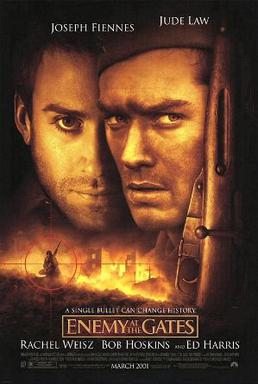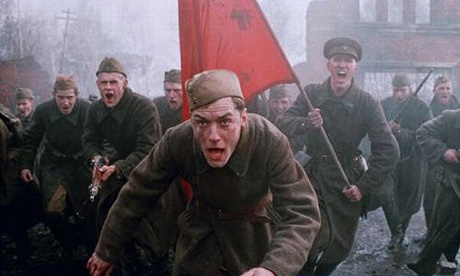In 2001, a slightly unusual World-War-II-movie hit theaters: "Enemy at the Gates". It was unusual because the heroes of the story were the Soviet soliders in Stalingrad, not the heroic American soldiers storming the beaches of Normandy or holding out in the grim winter against the German onslaught in the Battle of the Bulge. Since there isn't exactly a flood of movies about the Eastern Front in World War 2, "Enemy at the Gates" came to shape the view on that part of the conflict for pretty much everyone who saw it. And that's not exactly a good thing.
 |
| It had Jude Law in it! |
The story of the movie is as follows: the Russian soldier Vassily Zaytsev is a natural sniper, and he survives a bloody, useless assault on a German hideout where his comrades did not. By chance he recues the life of commisar Danilov, with whom he becomes friends. Danilov recognizes what a propaganda tool Zaytsev can be and shores up his reputation. Zaytsev only shoots German officers, inspiring fear into the heart of the enemy, who dispatches his own elite sniper, Major König. The ensuing duel is complicated by the love that Zaytsev and Danilov have for the same female soldier...
 |
| Handsome, handsome sniper. |
The plot isn't exactly complicated or anything, and must twists and turns can be seen coming from a mile around. It also takes some liberties with historic accuracy in the duel in favor of a suspenseful storyline, which is no problem in and of itself (Zaytsev killed König in the shootout that König survives in the movie and is later killed himself in the battle of Stalingrad).
 |
| No money for guns, but red flags, no problem. |
Problematic is the depiction of the fighting nature of the Soviet army, especially the first assault that Zaytsev takes part in. The soldiers don't get enough weapons. Every second man gets a rifle, the other one three bullets. Predictably, they are slaughtered. When they try to retreat, they are mowed down by their own machine guns stationed in their back, because no one retreats one step. For the motherland!
| It's "rodina" in Russian. |
While such an action was actually reported in the early days of Operation Barbarossa, the German surprise attack on the Soviet Union in the summer of 1941, by the point of the battle of Stalingrad in fall 1942, the Soviet army had enough rifles and ammo for their men, and such attacks weren't conducted because the Soviet commanders got their shit together (unlike the Japanese, who continued their Banzai-bullshit until the closing days of the war).
 |
| On the other hand, they used Bushido instead of machine guns. |
The Soviets as essentially bad guys, but not quite as bad as the Germans, is of course a sexy narrative. While rooted in historical truth (Hitler and Stalin surely share the same highlighted place in hell), the scene got a status as representative for Soviet war tactics it doesn't deserve. By 1942/43, the Soviet army had essentially closed the gap in equipment and tactics to the Germans that they lacked before. Sending their own men mindlessly into closely guarded positions wasn't considered as something one does anymore.
 |
| Because this result is foreseeable. |
Sadly, the picture influenced a whole generation of people watching the movie. You can almost be sure that it will be invoked or even recreated everytime something popular covers the Eastern Front. For example, in "Call of Duty 5", you play a Soviet soldier who takes part in such suicidal attacks and then has to snipe his way through Stalingrad. In the recently released "Company of Heroes 2", the opening cinematic all but inserts the scene of the Wolga crossing from "Enemy at the Gates".
 |
| Red and many |
But the "inspiration" isn't reduced to recreating the images of the movie. What's more disturbing is that the flat-out insane disregard for human life is transported into these games as some kind of thing that makes the Soviets cool for the player. They are essentially what the Zerg are for "StarCraft", sending droves of badly equipped, weak units at the technically superior enemy to overwhelm him. While it is true that for Soviet commanders, a human life wasn't exactly a consideration (Stalin charmingly put it in a proverb: "A single death is a tragedy, a million deaths are statistic"), it's also true that by 1943, the Soviet army was as formidable as the German one in terms of tactic, equipment and strategy.
 |
| Almost indistinguishable. |
Yet games as well as popular historic accounts rely massively on the myth that Soviet equipment and tactic were inferior and that the high quality German troops were defeated by pure numbers. While it's true that the Soviets had a numerical advantage, it's also true that German commanders didn't particularily care about the lives of their soldiers neither, especially not so in the closing stages of the war.
 |
| Or does anyone think there was any military sense to that battle? |
But this is never part of these narratives, which are content in putting the German side in the position of the hopeless yet brave defender, reinforcing the old tale of superior German soldiering and strangely elevating the Wehrmacht, which was a murderous instrument in an even more murderous war. While it is laudable that games and other popular works try to adress the issue of the ambivalence of the Red Army (fighting with the Allies against Hitler, but being a pretty unpleasant instrument itself), the Germans don't get such scrutiny. This caricature of World War II needs to stop.
Interesting. I thought it was an okay movie. As you state, the duel aspect is over inflated. Really enjoyed any scenes along the riverbank.
ReplyDeleteHave you seen Peckinpaugh's Cross of Iron or the german film Stalingrad? I liked them both, but what did you think of them? Can't think of too many other Eastern Front films except a few older Polish ones (that were good).
I never saw the "Cross of Iron". As far as I can recall, it didn't exactly get good reviews. I have seen Stalingrad, however, it's quite a long time ago. I recall some key scenes (friendly fire, collecting dog tags, penal battaillon, the finding of the abused women and the final death in the snow), though I don't remember the arc of the story.
ReplyDeleteI agree with your analysis. I think popular conceptions of the Eastern Front (the idea that the Germans stood a real chance of holding their conquests, and the narrative of Soviet complete incompetence) aligns with similar popular myths about the the ability of late-war 'wonder weapons' to influence the course of the war.
ReplyDeleteBoth of these narratives draw from the desire to inflate Hitler's competence, because admitting that Nazi Germany was never going to win a war with the USSR is seen as cheapening Anglo/American sacrifice. Hence the tendency to overestimate German chances of victory, and disparage the Soviets.
(feel free to delete this note, but I think there's a typo in the title)
What typo?
DeleteAnd I totally agree. Western narratives also like to overemphasize the American impact in the field (like their was no one there before, and the war in Europe basically started in 1944 with Overlord).
I believe "if" should be "it". Not that I care I just thought I'd mention it.
ReplyDelete